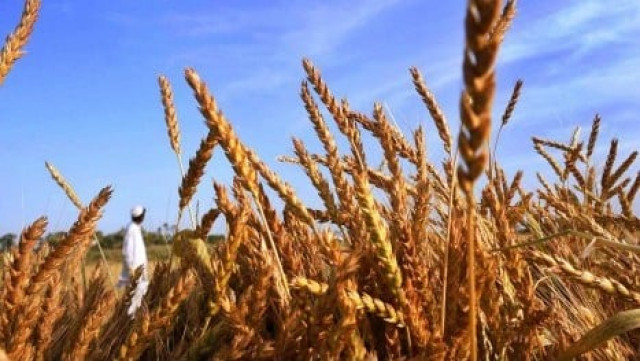Punjab achieves 95% of wheat sowing target
Meeting reviews progress on planting staple crop across country

The province of Punjab has taken lead in planting wheat crop and has so far achieved 95% of the target. The government, in a bid to encourage farmers, has announced wheat support price of Rs1,950 per 40 kg for sowing season 2021-22.
The National Assembly Standing Committee on National Food Security and Research had recommended a support price of Rs2,200 per 40 kg in order to provide proper return to wheat growers. However, the government turned down the proposal. Considering it unattractive, farmers have not welcomed the support price of Rs1,950 in the face of inflated input costs, which have risen primarily because of a record high price of high-speed diesel.
Besides the costly fuel, prices of di-ammonium phosphate (DAP) fertiliser have increased sharply, reaching Rs10,000 per bag. Urea price trend is no different as farmers are compelled to buy a 50kg bag for over Rs3,000, driven higher by profiteering on the part of some dealers.
Despite these challenges, wheat plantations in Punjab have touched 95% of the target. Sindh is trailing with cultivation meeting 76% of the goal, followed by Khyber-Pakhtunkhwa at 75% and Balochistan at 68%. Federal Minister for National Food Security and Research Syed Fakhar Imam chaired a meeting of the wheat review committee to discuss the crop sowing position for current season.
Representatives of agricultural departments of provinces were present in the huddle. Punjab Agriculture Minister Hussain Jahania Gardezi emphasised that the province would surpass its sowing target of 16.2 million acres. “Water availability is a limiting factor while Punjab is working on improving its track and trace system for seeds,” he said.
The meeting was briefed that the target for wheat cultivation in Sindh was 2.97 million acres while K-P was assigned the target of 2.2 million acres. Balochistan reached 68% of the target of 1.36 million acres. Imam stressed that the purpose of holding the meeting was to monitor progress and ensure that the assigned wheat crop targets were met.
He called sowing period the most critical for wheat crop and said that any issues arising in the way should be addressed timely in order to stay on track. “A few parameters have been established to ensure wheat crop sowing is monitored effectively,” he said.
These parameters include but are not limited to wheat sowing area and completion percentage, sowing method (drilling or broadcasting), quantum of fertiliser (DAP and urea) consumption during cultivation, use of certified seeds, use of seed varieties (old or new rusttolerant), availability of herbicides, pricing status, etc.
Pakistan Meteorological Department representative Syed Mushtaq apprised the committee that lowerthan-normal rainfall was expected in December and January but things would normalise in February. Imam emphasised that for proper communication among all stakeholders, the Indus River System Authority (Irsa) and National Fertiliser Development Centre (NFDC) would also be made part of the wheat review committee.
He assured meeting participants that necessary steps would be taken immediately for ample supply of factors of production. He praised efforts of Punjab to encourage farmers to plant wheat seeds in time. Punjab agriculture minister pointed out that the provincial government conducted seminars to create awareness besides entering into partnerships with five agricultural universities to mobilise agri-department students to ensure proper sowing of wheat seeds.



















COMMENTS
Comments are moderated and generally will be posted if they are on-topic and not abusive.
For more information, please see our Comments FAQ